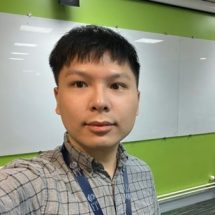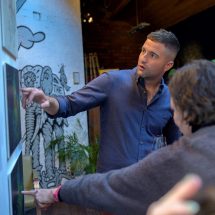The ESRC Postdoctoral Fellowship Scheme is aimed at those in the immediate postdoctoral stage of their career, and provides an opportunity for Fellows to maximise the outputs and impact of their PhD research.
2024-25 Postdoctoral Fellows

Jessica Fagin
Profile
Dr Jess Fagin is an ESRC Post Doctoral Fellow in the Department of Sociological Studies at the University of Sheffield. Her research interests include critical race studies, ethnographic methods and narrative identities, with a focus on the dynamics of whiteness, gender, social class, stigma and anti-Muslim racism in Britain. She completed her PhD at The University of Exeter which ethnographically focussed on an underexplored aspect of rural and urban economies and working-class livelihoods: sheep slaughterhouses, and in particular, halal slaughterhouses. By exploring the complexities of halal sheep meat economies, and the everyday relations between the multi-ethnic workers who labour in them, her thesis reassessed media, political and academic explanations about the economic and cultural drivers of increased anti-immigrant and anti-Muslim sentiments in multicultural settings in Britain.
Building on her PhD, her ESRC Post Doctoral Fellowship, “Without the Muslims, We’d be Out of a Job”: Race, Whiteness, Nation and Class in England’s Sheep Slaughterhouses” will be centred on publishing activities targeted at both academic and non-academic audiences, alongside impact work on labour inequalities within the slaughter sector and anti-racist organisations.
Most recently, she has worked as Post Doctoral researcher on the “Twice as Good” ERC grant funded project at The University of Exeter, investigating women political candidates’ experiences of sexism on the campaign trail during the 2024 British General Election. She holds an MA in the Anthropology of Food from SOAS, London, where her ethnographic research focussed on traders at Smithfield Meat Market, London. She is a co-convener of the Association of Social Anthropologists Anthropology of Britain network.
Email: j.fagin@sheffield.ac.uk

Yu-Tung Wu
Profile
Yu-Tung Wu is a Postdoctoral Research Associate at the School of Geography and Planning, University of Sheffield, specializing in the relationship between housing financialisation and urbanisation in Taiwan and the immigrant housing “Military Dependents’ Villages.” He completed his PhD in urban studies and planning at the University of Sheffield, supervised by Professor Ryan Powell and Professor Ste Hincks. His thesis was titled “Housing Transformations and Financialised Urbanism: The Case of Military Dependents’ Villages in Taipei.” He completed his undergraduate in 2018 in urban planning at National Cheng Kung University, Taiwan, and was awarded the degree of MSc in Cities and Global Development by the University of Sheffield in 2020.
His research interests include neoliberalisation and housing financialisation in East Asian developmental states, examining their actual influence on daily life and long-term housing conditions. Currently, his research explores the dynamic interplay between community and space using a Qualitative GIS mapping approach, with a focus on state simplification and housing verticalisation.
Research interests: housing financialisation, privatisation, urbanisation, Military Dependents’ Villages, migration, immigrant housing policy, intergenerational housing, state simplification, de-militarisation
Email: yu-tung.wu@sheffield.ac.uk

Michael Livesey
Profile
I am an ESRC Postdoctoral Fellow at the University of Sheffield, mentored by Dr Joanna Tidy. My project, entitled ‘Genealogising the Troubles’, explores the histories of British counter-terrorism and peacebuilding practice in Northern Ireland. I am currently engaged in writing a monograph situating evolutions in UK security practice during the Troubles in relation to longer-term patterns of Anglo-Irish politics. I completed my PhD in Politics at the University of Sheffield in January 2024, having previously studied History at the University of Oxford and International Relations at the London School of Economics. My PhD was supervised by Dr Lisa Stampnitzky, and funded by an ESRC studentship. Before beginning my PhD, I worked in the UK Parliament as a researcher in the Shadow Transport Team. I have published articles on the histories of British security in journals including the European Journal of International Security, the Review of International Studies, and Critical Studies on Terrorism. My work is informed by post-structuralist and genealogical traditions, and involves use of mixed methods for both quantitative and qualitative analysis of textual and spatial sources.
Research interests: Critical terrorism studies; critical security studies; UK and Irish politics; history; historical approaches to international relations; post-structuralism; discourse analysis; corpus linguistics; visual methods.
Email: michael.livesey@sheffield.ac.
Twitter: @malivesey
Website: www.mlivesey.org
University of Sheffield profile: https://www.

Megan Wright
Profile
Megan is an ESRC Postdoctoral Fellow based in the education department at the University of York. Her fellowship focuses on the psychology of modern adulthood and investigates when and why people feel like adults today, and how this could impact mental health and wellbeing. During this fellowship she will continue to research how adult status is associated with wellbeing. Megan’s fellowship aligns with the Wellbeing, Health, and Communities pathway.
Previously, Megan has worked as a postdoctoral research associate at the University of Nottingham and has worked in the research team for Hogan Assessments, a leading provider of personality assessment tools based in the US. Megan completed her PhD in psychology in education at the University of York in 2023. Her thesis was titled “What makes an adult? An investigation into the psychology of modern adulthood” and was supervised by Professor Sophie von Stumm.
During her PhD, Megan investigated whether people perceive themselves as adults, how adulthood is defined today, and whether adulthood is seen as a positive time of life. She also developed a taxonomy of adult development, the CARES taxonomy, to describe the psychological growth and change that takes place across adulthood. Her fellowship will continue this by exploring how perceptions of adulthood and the CARES taxonomy may impact the identity development, mental health, and well-being of adults.
Research interests: developmental psychology, personality psychology, wellbeing and mental health, open and transparent scientific practices.
Email: m.wright@york.ac.uk
Postdoctoral Fellows from previous years
Lee Pretlove – University of Sheffield
Selamawit Robi – University of Sheffield
Joseph Ward – University of Sheffield
Simona Manni – University of York
Claire Crawford – University of York
Kelly Lloyd – University of Leeds
Alex Louise Pearl – University of Leeds
- Edward Brookes – University of Hull
- Lucy Eddy – University of Bradford
- Nirali Joshi – University of Sheffield
- Tamsin Mitchell – University of Sheffield
- Cara Molyneux – University of Leeds
- Natalie Richardson – University of York
- Lindsey Collins – University of Bradford
- Adam Ferhani – University of Sheffield
- Natalie James – University of Leeds
- Sarah Knight – University of York
- Andrea Peinhopf – University of York
- Euan Raffle – University of Leeds
- Jamie Redman – University of Sheffield
- Leon Felipe Tellez Contreras – University of Sheffield
- Harriet Thew – University of Leeds
- Nicola Antaki – University of Sheffield
- Amy Atkinson – University of Leeds
- Marketa Dolezalova – University of Leeds
- Gill Francis – University of York
- Charlotte Kitchen – University of York
- Emma Long – University of York
- Laura Towers – University of Sheffield
- Lauren White – University of Sheffield
- Oznur Yardimci – University of York
- Choo Yoon Yi – University of Sheffield
- Dr Madeleine Power – University of York
- Dr Eleanor Bland – University of Leeds
- Dr Chloe McRae Gilgan – University of York
- Dr Ian Shannon – University of Leeds
- Dr Emma James – University of York
- Dr Eric Hoddy – University of Sheffield
- Dr Sarah Joyce – University of Leeds
- Dr Charlotte Hoole – University of Sheffield
- Dr Ellie Gore – University of Sheffield
- Dr Jim Kaufman – University of Sheffield
- Dr Sonja Erikainen – University of Leeds
- Dr Emilee Rauschenberger – Manchester Metropolitan University
- Dr Jingzhi Chen – University of York
- Dr Rosie Campbell OBE – University of York







